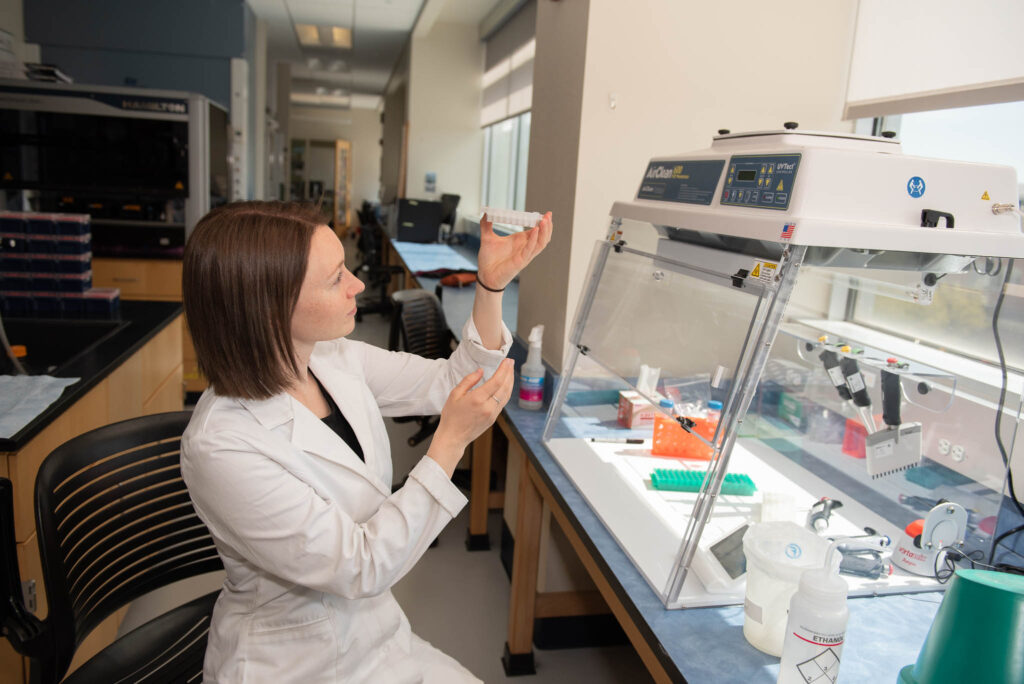Vic Monsaint-Queeney, PhD candidate

Interviewed by STICH Scholar and Ecoss social media specialist Kayla Blair.
Meet Vic Monsaint-Queeney, a PhD candidate in Bruce Hungate’s lab! Here, Vic studies bacteria in the soil on the San Francisco Peaks in Flagstaff, where she looks at the different types of nitrogen that these microbes consume. The research involves her looking at the types of nitrogen they eat, how much they eat, and how different environmental factors like temperature affect this consumption! She also recently worked at Pacific Northwest National Laboratory as part of the Department of Energy Science Graduate Student Research Fellowship, where she studied soil in Minnesota peat bogs.
How do you hope your research will impact your community and society?
I think a lot of the techniques I use are cutting edge, but what they reveal is adding to foundational knowledge about these soil microbes. These microbes play a very important role in global cycles, like in the carbon cycle, nitrogen cycle, and the water cycle. If we find out which bacteria are the biggest players in the nitrogen cycle, it could help generate more ecosystem-friendly, less chemically-intensive forms of fertilizer. That’s a couple decades in the future, but it could be like the next Green Revolution.
What is your favorite part of your research?
How little I know; that’s what got me into microbes. I was in an upper-level microbiology class, and a professor was saying that we thought this about human cells until like 20 years ago when we found out it was actually this. It’s exhilarating to be in this vast sea of knowledge that no one else has cracked yet. It feels very daunting, but people are really scrappy and creative. We are always imperfect so it feels pretty low pressure. Dr. Hungate has been encouraging me to push the limits of quantitative measurements in the field, because even if it’s wrong, I’ll be the first one to do it.
What has been the most challenging part of your research?
I think COVID has been really tough, because I think a really important part of working towards my PhD has been community. Research is really hard to do in isolation, and it’s not always possible to have that same type of connection. You can’t expand your network, and it felt like a holding pattern for a while. It was like running a marathon, but not knowing when the marathon was ending.
What are some challenges you’ve seen communicating your science with the public?
Working with things that people can’t see very easily is challenging. I do think there is some romance to microbes and bacteria, when you think about how they drive these massive global cycles. A lot of my science is also not applicable to solving current problems, so it’s hard to give an instantaneous result based on my research. Science is a process, not just a result.
What does a day in your life look like?
I do a lot of extracurricular stuff: I’m a peer mentor for the STICH program at the Center for Science Teaching and Learning, and I teach Intro to Microbiology lab, where I love to get more people obsessed with microbes. I find it very rewarding working with students. I’m pretty late-stage in my PhD program, so most of my data has already been collected and I’m doing processing the data. Right now, I’m writing code with a colleague to process DNA sequence data for the microbe species we were looking at.
My PhD also focuses on scaling up nitrogen transformations: how much does a single microbe species eat, and how does that impact the ecosystem? It’s just really hard to measure things you can’t see, so we have to use some indirect methods to get measurements.
What is something you wish you knew as an undergraduate wanting to pursue science?
One skill I wish I had worked on was knowing what I need and having the courage to ask for that, as well as the confidence to know who I am and what I want. I understand that there is a lot of privilege to be able to do this, as well as a lot of practice, but it’s been very empowering.